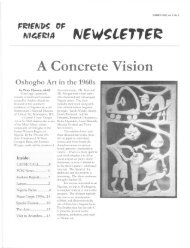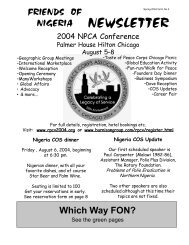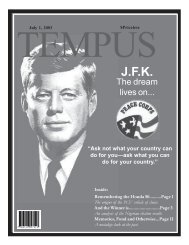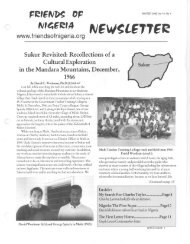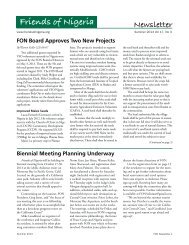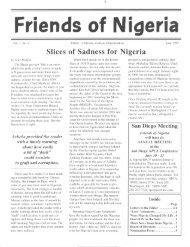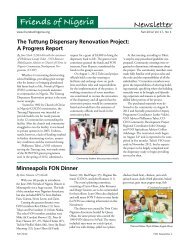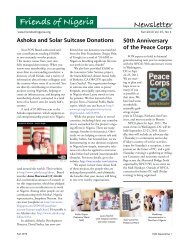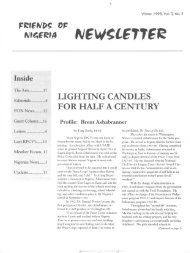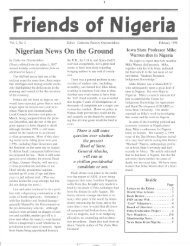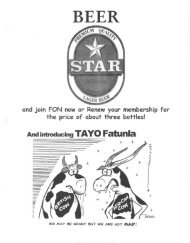RecollectionsApocalypse Then — Part OneBob Criso, <strong>Nigeria</strong>/Somalia 66-68Ishiagu: July, 1967Eager for <strong>news</strong> <strong>of</strong> the war, I huddledwith my students many evenings arounda transistor radio and a kerosene lamplistening to Radio Enugu. Refugees werereturning from the North with stories <strong>of</strong>Igbos being hacked into pieces, pregnantwomen being cut open and childrenscreaming inside burning homes. Therewas a report on the radio about a trainfilled with bloody body parts that weresent down from the North “as a warning.”I was skeptical about that one untilI saw a woman returning to the villagecarrying the head <strong>of</strong> a man. She said shehad retrieved it from the train.Several weeks earlier, Ruth Olsen, thePeace Corps Director in the East, hadgiven me a van as part <strong>of</strong> an emergencyevacuation plan. I was supposed to pickup several PCV’s in the area if I got wordfrom the Peace Corps <strong>of</strong>fice to evacuate.(Many PCV’s in the East had already leftby this time when they were given thechoice.) I felt safe in friendly and remoteIshiagu but I didn’t realize how cut-<strong>of</strong>fI was from what was going on nearby.Reality hit when two jeeps <strong>of</strong> Biafran soldierspulled up in front <strong>of</strong> my classroomone morning and ordered the principalto shut down the school. They said itwould be used for Biafran army barracks.The students left, the teachers left and Iwent home anxious and uncertain aboutwhat to do.Bob Criso, then.With no word yet from Ruth Olson,the next day I decided to check in withtwo PCV’s who lived about an houraway. When I left the red clay road infront <strong>of</strong> my house and hit the pavedroad, I entered what felt like a twilightzone. All signs identifying any buildingor giving directions anywhere hadbeen taken down. The road was a series<strong>of</strong> roadblocks withcut-down trees blockingpassage. Local vigilanteswielding machetes andwooden clubs mannedthem. I was stopped,searched, scrutinizedand interrogated. All<strong>of</strong> a sudden, anyonewho didn’t know mesuspected me <strong>of</strong> being aspy or a mercenary.“Where are yougoing?”“What is your businessthere?”“Search the van!”“What is this map for?”“Empty your pockets!”“How do we know he isn’t lying?”My limited Igbo and knowledge<strong>of</strong> the area became an invaluable asset.I made it to Laura and Jeff’s school(not their real names) but didn’t go anyfurther. The roads were too dangerousand unfamiliar to risk it. We drove backto Ishiagu to wait for word from thePeace Corps, though not without furtherintimidation and humiliation, especiallyfor Laura.Not long after reaching my house,a crowd began to gather around it. Twomen then came to the front door. Felix,my houseboy, spoke to them. Felix toldme the men wanted to know who thestrangers were. When I explained thatthey were also PCV’s, the men weren’tsatisfied. Felix was trembling when hesaid the men now wanted to search thehouse. I remember thinking if I let themcross that boundary, what would be next?“Tell them No,” I said to Felix. Themen stormed out and returned to thecrowd. Laura Jeff and I watched from awindow while two men rolled a rustedblue fifty gallon drum <strong>of</strong> kerosene undermy house.To be continuedBob Criso, now,12 <strong>FON</strong> Newsletter <strong>Spring</strong> 2013
In MemorianBy Jim Clark (12) 64-66Hubert C. ‘Nick’ Knilans (08)63-65Major Hubert C. “Nick” Knilans,94, <strong>of</strong> the Wisconsin Veterans Home inKing, passed away Friday, June 1, 2012,at the Veterans Home. Major Knilanswas an English & geography teacher atMen’s Training College in Kano duringthe years 1964-65.He was born in Delavan, WI onDec. 27, 1917 to the late Clarence G.and Laura (Nott) Knilans. Hubert ClarenceKnilans, always known as Nick,attended the local high school andworked on the family farm until April1941, when he was drafted for militaryservice. He left for Canada in October1941 where he enlisted as a pilot inthe Royal Canadian Air Force. Laterin 1941, he was transferred to the U.S.Army Air Force where he served duringWorld War II surviving 50 operationsand bringing six <strong>of</strong> his original sevenmancrew through alive. He, however,was the only survivor <strong>of</strong> his originalpilot’s course and was a highly decoratedpilot receiving awards from the BritishDistinguished Services Order includingthe Canadian Distinguished FlyingCross and the U.S. Flying Cross. Afterthe war, he retired from the USAAF andbecame a teacher in California. After a25-year teaching career, including histwo years as a Peace Corps volunteer, heretired in 1978.Even after retirement, Major Knilanschampioned the betterment <strong>of</strong> the lives<strong>of</strong> American youth with Mexican rootsand became a counselor within the Californiaprison system. He continued towork tirelessly to support programs forunderprivileged youth until his passing.Major Knilans is survived by hissister, Janice Higgenbotham <strong>of</strong> CannonFalls, Minn.; his nephews, Eric andNick Higgenbotham; and his nieces,Maureen Konley and Tanis Kahabka-Knilans. He was preceded in death byhis parents, Clarence and Laura Knilans;three brothers, Lawrence, James andMeredith Knilans; and one sister, FrancesMahar.[Source: Greater Milwaukee Todayonline magazine]Walter Taylor Lewis, Jr. (04)62-64Walter T. Lewis, Jr. passed away onThursday, December 20, 2012. Waltserved as a Peace Corps volunteer teacherin Oguta via Owerri and was a member<strong>of</strong> <strong>Nigeria</strong> 04 from 1962-64. He alsoserved as a member <strong>of</strong> <strong>Friends</strong> <strong>of</strong> <strong>Nigeria</strong>’s(<strong>FON</strong>) board <strong>of</strong> directors for severalyears and was active in planning PeaceCorps and <strong>FON</strong> events in the D.C. area.Walt was born in Greenville, Mississippi,on April 20, 1940 to the lateLuratha Lewis and Walter Lewis Sr. Heattended Sacred Heart Elementary andSacred Heart High Schools in Greenvillegraduating in 1958. Following highschool, he attended Xavier University inNew Orleans, LA where he received aB.A. in History and Secondary Education.After graduation Walter volunteeredto teach for two years in Oguta, <strong>Nigeria</strong>,an experience to which he <strong>of</strong>ten referredas one <strong>of</strong> the most rewarding and enlighteningexperiences <strong>of</strong> his life. Returningfrom <strong>Nigeria</strong>, he accepted a teachingposition at Benjamin Banneker Jr. HighSchool in Washington, DC and latertaught for a short time in Grants, NewMexico. Walter returned to Washington,DC to teach for the next three years atKelly Miller Jr. High School.Soon after, Walter began workingfor the U.S. Department <strong>of</strong> Education inthe Teacher Corps program and traveledacross the United States to meet withvarious school <strong>of</strong>ficials and administrations— work he enjoyed thoroughly.The Teacher Corps program was the first<strong>of</strong> several education-related programsto which Walter was committed and inwhich he served until his retirement in1994. After retirement, Walter remainedactive in education by serving as a substituteteacher at Carmody Hills ElementarySchool until 2002.ObituariesFrom his incredible experience as aPeace Corps volunteer, his world travels,his single handedly raising his daughterfrom the age <strong>of</strong> seven, his stellar 32 years<strong>of</strong> Federal service to his dedication tothe DC and Prince George’s County,MD schools as a teacher and substituteteacher, Walter T. Lewis, Jr. lived andenjoyed a “very blessed and fulfilled life.”Walter is survived by his daughter,Karen Lewis Smith; three sisters, fivenieces, five nephews; and a host <strong>of</strong> relativesand close friends.[Source: Legacy.com, Karen Lewis Smith]Kenneth A. Welch (29) 67-67Kenneth A. Welch, 63, <strong>of</strong> AtwaterStreet, New Haven, died Tuesday, June 5,2007 at the Connecticut Hospice Homein Branford. He served as a member <strong>of</strong>Peace Corps group 26 during the year1967.Born in Princeton, ME on March 29,1944, Kenneth was the son <strong>of</strong> the lateRev. Maxwell M. and Elizabeth LincolnDorr Welch, missionaries in Angola, Africa.He obtained his B.A. Degree fromUCONN and his M.S. Degree fromSouthern Connecticut State University.He had worked for the State <strong>of</strong> ConnecticutAgricultural Experiment Station for39 years until his retirement on September1, 2006. Kenneth had served in theU.S. Army during the Vietnam Era. Hewas a member <strong>of</strong> the CT EntomologicalSociety; a member <strong>of</strong> the North HavenCongregational Church where he sang inthe choir, served as treasurer and was amember <strong>of</strong> the Board <strong>of</strong> Finance.He was the husband <strong>of</strong> Catherine P.Griffis Welch and the father <strong>of</strong> Brian (Susan)Welch <strong>of</strong> Monte Vista, CO, DanielA. Welch <strong>of</strong> Meriden, Amy C. Welch <strong>of</strong>Hamden and Heidi J. Welch <strong>of</strong> Syracuse,NY; brother <strong>of</strong> George (Bobbi) Merritt<strong>of</strong> Hackensack, NJ, Thomas Welch <strong>of</strong>Jefferson, ME, Susan (Fred) Smith <strong>of</strong>Rock Hill, SC, Patricia (Garland Gates)Welch <strong>of</strong> Shelby, OH.[Source: The Hartford Courant,June 7, 2007](continued on p. 19<strong>Spring</strong> 2013<strong>FON</strong> Newsletter 13



